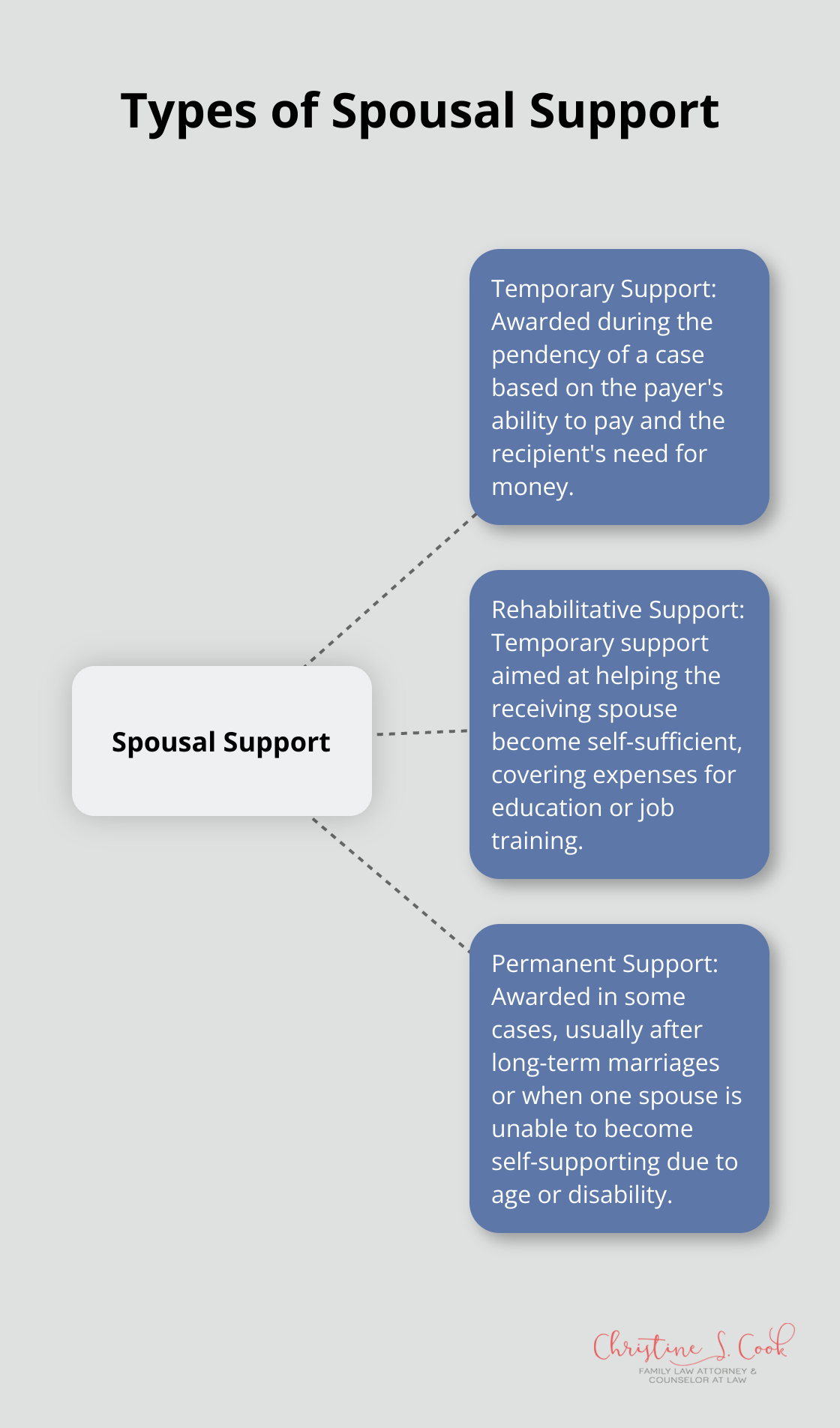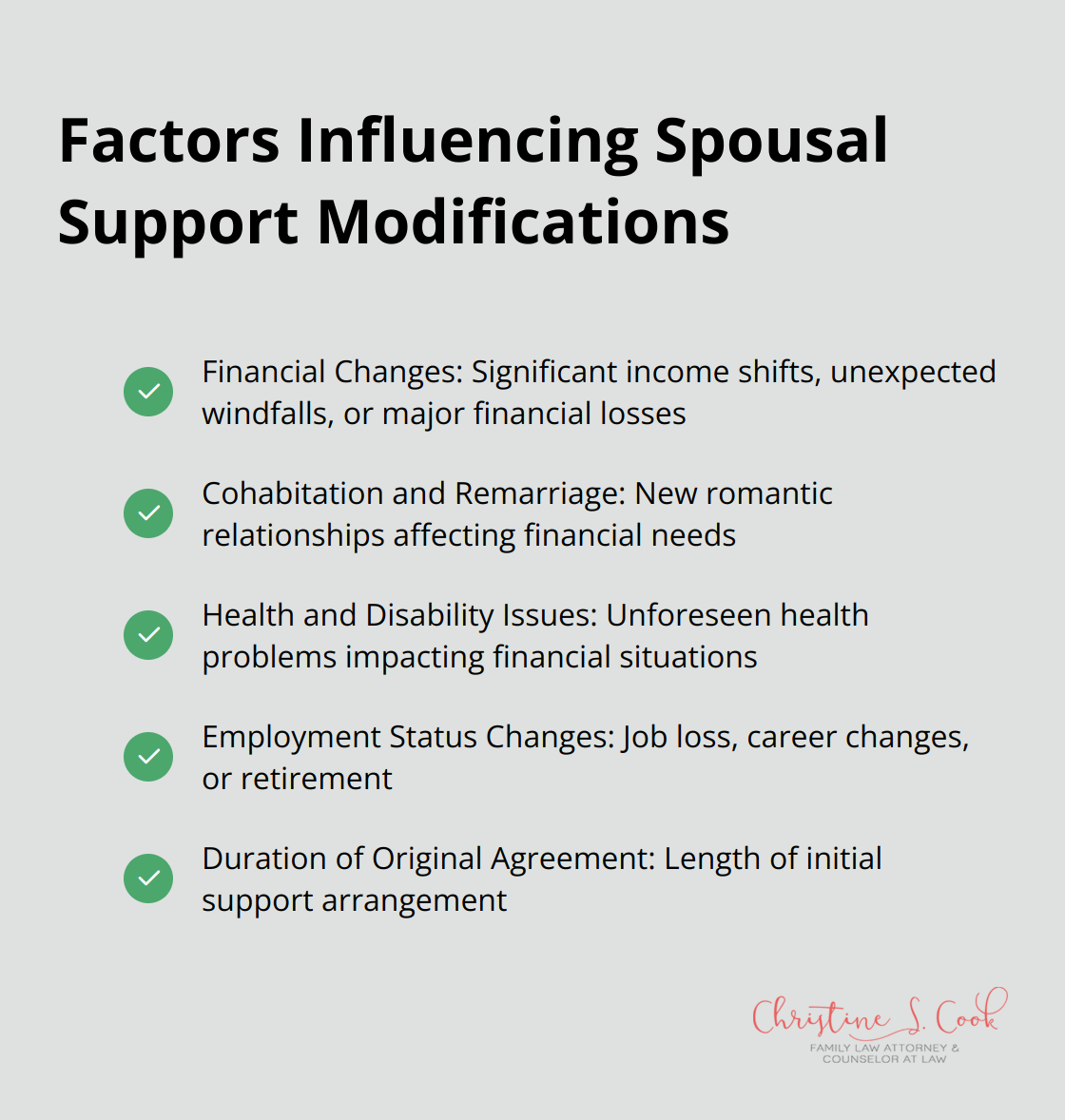Divorce can be a complex and emotionally challenging process, especially when it comes to financial matters. At Christine Sue Cook, LLC, we often hear the question: “Can I get spousal support after divorce is final?”
The answer isn’t always straightforward, as it depends on various factors and circumstances. In this post, we’ll explore the possibilities of obtaining or modifying spousal support after a divorce has been finalized.
Spousal support (also known as alimony) is a financial arrangement where one spouse provides monetary assistance to the other after a divorce. Its primary purpose is to address the economic imbalance that often occurs when a marriage ends. This support helps the lower-earning spouse maintain a standard of living similar to what they experienced during the marriage. It becomes particularly important when one spouse has sacrificed career opportunities to support the family or the other spouse’s career advancement.
Courts recognize several types of spousal support, each serving a distinct purpose:

When determining spousal support, courts consider various factors. These may include:
Navigating the complexities of spousal support requires experienced legal representation. Whether you seek support or face a request to pay, protecting your rights and interests throughout the process is essential. An experienced family law attorney can provide invaluable guidance and representation in these matters.
As we move forward, let’s explore how spousal support arrangements can change after a divorce is finalized.
Life after divorce often brings unexpected financial shifts. At Christine Sue Cook, LLC, we understand these changes can necessitate modifications to spousal support arrangements.
Several circumstances may prompt a need to adjust spousal support:

For instance, a paying spouse who loses their job might seek a reduction in payments. Alternatively, if the receiving spouse lands a high-paying position, the paying spouse could request a decrease or termination of support.
To modify spousal support, one must file a motion with the court that issued the original divorce decree. This process involves:
It’s important to note that informal agreements between ex-spouses lack legal enforceability. The court must approve any changes for them to take effect.
The party seeking modification must demonstrate:
Courts typically require clear and convincing evidence to support these claims. This might include financial records, medical reports, or employment documentation.
Navigating spousal support modifications can prove complex. An experienced family law attorney can provide invaluable guidance, anticipate potential challenges, and prepare comprehensive evidence to support your case.
As we move forward, let’s examine the specific factors courts consider when evaluating post-divorce spousal support modifications.

Courts evaluate significant financial shifts when considering modifications to spousal support after divorce finalization. Without an agreement, the court will assess the facts presented, and it may hold a hearing to examine financial documents and testimony. These changes can include substantial income increases or decreases, unexpected windfalls, or major financial losses. For example, a 30% income reduction due to company downsizing might justify a decrease in support payments. Conversely, if the recipient spouse doubles their income with a new job, the paying spouse could request support reduction or termination.
The recipient spouse’s romantic life can impact spousal support arrangements. Many jurisdictions automatically terminate alimony upon remarriage. Cohabitation, while not always causing automatic termination, can lead to support reduction or elimination. Courts examine the financial implications of new living arrangements. If the recipient spouse’s new partner contributes significantly to household expenses, the court may determine a diminished or eliminated need for support.
Unforeseen health problems or disabilities can alter the financial landscape for either party. A paying spouse who develops a chronic illness affecting their work ability may seek support payment reduction. Similarly, a recipient spouse facing a sudden disability preventing self-sufficiency might request support extension or increase. Medical documentation and expert testimony often play key roles in these cases (particularly in demonstrating the long-term impact of health changes).
Employment status shifts, whether voluntary or involuntary, can trigger spousal support modification requests. Job loss, career changes, or retirement can potentially justify adjustments. However, courts scrutinize these changes closely to prevent system manipulation. For instance, if a paying spouse voluntarily quits a high-paying job for a lower-paying passion project, the court may impute income based on earning capacity rather than actual earnings.
The length of the original spousal support agreement can influence modification decisions. Short-term agreements (e.g., rehabilitative alimony) may face more scrutiny for changes, while long-term or permanent support arrangements might allow for more flexibility in modifications. Courts consider whether the original agreement’s purpose has been fulfilled or if circumstances have changed significantly enough to warrant adjustment.
Spousal support after divorce is a complex issue that can change over time. The question “Can I get spousal support after divorce is final?” doesn’t have a simple answer. It depends on various factors, including the terms of your original divorce decree, your current circumstances, and the laws in your jurisdiction.
At Christine Sue Cook, LLC, we understand the intricacies of spousal support cases. Our experienced team can guide you through the process of seeking modifications or defending against unwarranted changes. We provide legal support, from evaluating your situation to representing your interests in court if necessary.
Professional legal advice is essential when you consider requesting a modification to your spousal support arrangement or responding to a modification request from your ex-spouse. The outcome of these cases can have significant long-term financial implications (making it important to have knowledgeable representation on your side). With the right legal support, you can protect your interests and work towards a fair resolution in spousal support matters.
